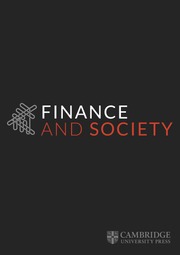Article contents
The ‘fintech revolution’ is here! The disruptive impact of fintech on retail financial practices
Published online by Cambridge University Press: 09 November 2023
Abstract
Fintech is celebrated for its disruptive and democratizing qualities that dis/reintermediates the finance value chain. Claims of a ‘fintech revolution’ assume that fintech is ‘disruptive’ because of its innovative capabilities, but the extent to which these disruptive forces have reconfigured consumer financial knowledge and practices is not well understood. Using a questionnaire to survey retail consumers in Singapore on their use of fintech in performing different financial tasks, this article critically examines these claims of disruption and democratization by grounding them in the financial behaviors of consumers as informed by a financial ecologies approach. The results show a limited impact of fintech in shaping consumer financial behaviors. Respondents use fintech mainly for basic transactional purposes like making mobile payments and account management, but not so much for more complex matters like savings, investing and credit. The findings also reveal a ‘stickiness’ in financial behaviors that emphasizes the high touch points of human interaction. This study illustrates fintech's variegated material outcomes by highlighting the unevenness in consumption of digital financial services and the enduring importance of human relationality in financial decision making.
- Type
- Article
- Information
- Creative Commons
- This is an Open Access article, distributed under the terms of the Creative Commons Attribution-NonCommercial-No Derivatives licence (http://creativecommons.org/licenses/by-nc-nd/4.0/), which permits noncommercial re-use, distribution, and reproduction in any medium, provided the original work is unaltered and is properly cited. The written permission of Cambridge University Press must be obtained for commercial re-use or in order to create a derivative work.
- Copyright
- © 2022 The Author(s)
References
- 2
- Cited by


